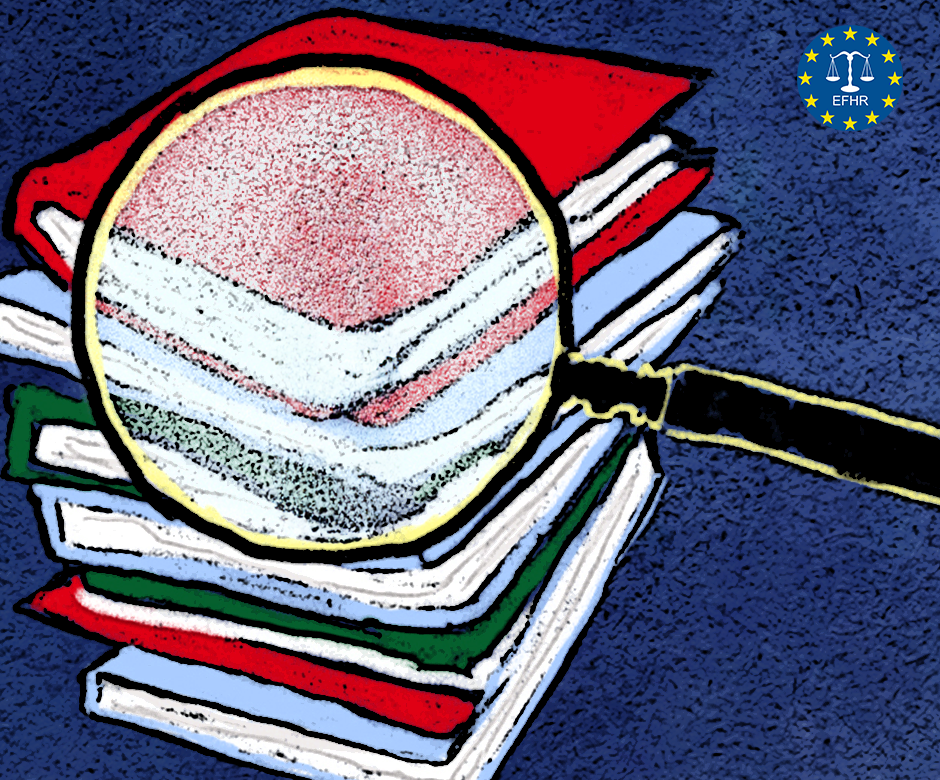- 2014/04/08
45 writers oppose the original spelling of names and surnames

 On 8th April 2014, 45 Lithuanian writers addressed a declaration to the highest authorities in Lithuania in which they expressed objections about the original spelling of names and surnames in documents issued in Lithuania. From the perspective of the European Foundation of Human Rights (EFHR), it is unpleasant and disappointing that a part of the Lithuanian intelligentsia does not understand and does not want to regulate issues that are not a mere whim of society, but, in actual fact, a human rights issue.
On 8th April 2014, 45 Lithuanian writers addressed a declaration to the highest authorities in Lithuania in which they expressed objections about the original spelling of names and surnames in documents issued in Lithuania. From the perspective of the European Foundation of Human Rights (EFHR), it is unpleasant and disappointing that a part of the Lithuanian intelligentsia does not understand and does not want to regulate issues that are not a mere whim of society, but, in actual fact, a human rights issue.
According to the writers, validation of non-Lithuanian marks in documents would be, amongst other things, against the constitutional rule of the national language and harmful for the nation. It would also be an infringement of the legal regulations referring to the official language. About 150 new letters and diacritic marks would appear in the Lithuanian language and it was argued that this would cause confusion both in the written and the spoken Lithuanian language and disrupt the working of institutions and companies.
In this situation the only thing that one may be pleased about is that the declaration was signed by just 45 out of a possible 363 members of the Lithuanian Association of Writers. It gives us hope that the rest of the Lithuanian writers are aware of the need to protect basic human rights, including those ones to write names and surnames in their original version.
The European Foundation of Human Rights would like to remind all of the fact that since 1922 the Lithuanian language has the status of the national language. However, the writing of non-Lithuanian names and surnames in their original versions was not always perceived as breaching the Constitution. The Surnames Law from 6th December 1938 laid down that the name of a person who is not Lithuanian is written in accordance with the rules of Lithuanian spelling and the Lithuanian language but it can also be written exactly as it is in his native language if the individual agrees with that and if the alphabet of this language is a Latin alphabet. The natural question arises then…why is it that such a regulation cannot be implemented this time?
A judgment of the Supreme Council from 1991 also provides the possibility for the writing of names and surnames in their original version, especially regarding the writing of names and surnames in passports belonging to citizens of the Lithuanian Republic. However, in the newest judgment of the Constitutional Court from 27th February 2014, it is explained that in some cases in the passport of a citizen of the Lithuanian Republic, letters belonging not just to the Lithuanian alphabet but also, other marks stemming from Latin may be used. In this way the Constitutional Court basically implemented the possibility of validation of writing names and surnames on the basis of the marks stemming from Latin. We have already mentioned this.
The fact should also be considered that using the Latin alphabet is wide-spread while registering license plate numbers, trademarks and company names… and so far the Lithuanian language has not suffered due to these allowances. Citing such facts, the European Foundation of Human Rights has proved more than a few times that it depends on the situation as to whether non-Lithuanian letters are deemed to threaten or not to threaten the statehood of Lithuania. We wrote about that.
In accordance with data from the Registry Office [Gyventojų registro tarnyba], in the passports of Lithuanian citizens there are over 8, 000 non-Lithuanian names and surnames registered (among them: Alexander, Matthew, Maxim, Szczerba, etc.). The original version of names and surnames is a current issue not just for the representatives of minorities, but also for those Lithuanians who have married a foreigner.
The foundation emphasizes that one of the basic rights of each citizen is the right to respect for personal and family life (including the right to write names and surnames in their original version). In accordance with Art. 11 of the Framework Convention for the Protection of National Minorities which Lithuania signed and ratified, „The Parties undertake to recognize that every person belonging to a national minority has the right to use his or her surname (patronym) and first name in the minority language and the right to official recognition of them, according to modalities provided for in their legal system”. Apart from that, Lithuania, as one of the parties of The International Covenant on Civil and Political Rights (ICCPR), is supposed to ensure that persons belonging to a national minority, religion or language group, along with other members of their groups, cannot be deprived of the right to have their own culture, faith or to be able to speak their mother tongue.
The above presented documents ensure the representatives of national minorities the right to unrestrained use of their mother tongue both in private and public life. The European Foundation of Human Rights sincerely hopes that the writers who signed the declaration will consider the above arguments and will support the draft law validating the non-Lithuanian writing of names and surnames in documents. We hope that, in this way, they will show they are not indifferent towards the issue of human rights protection.
EFHR



